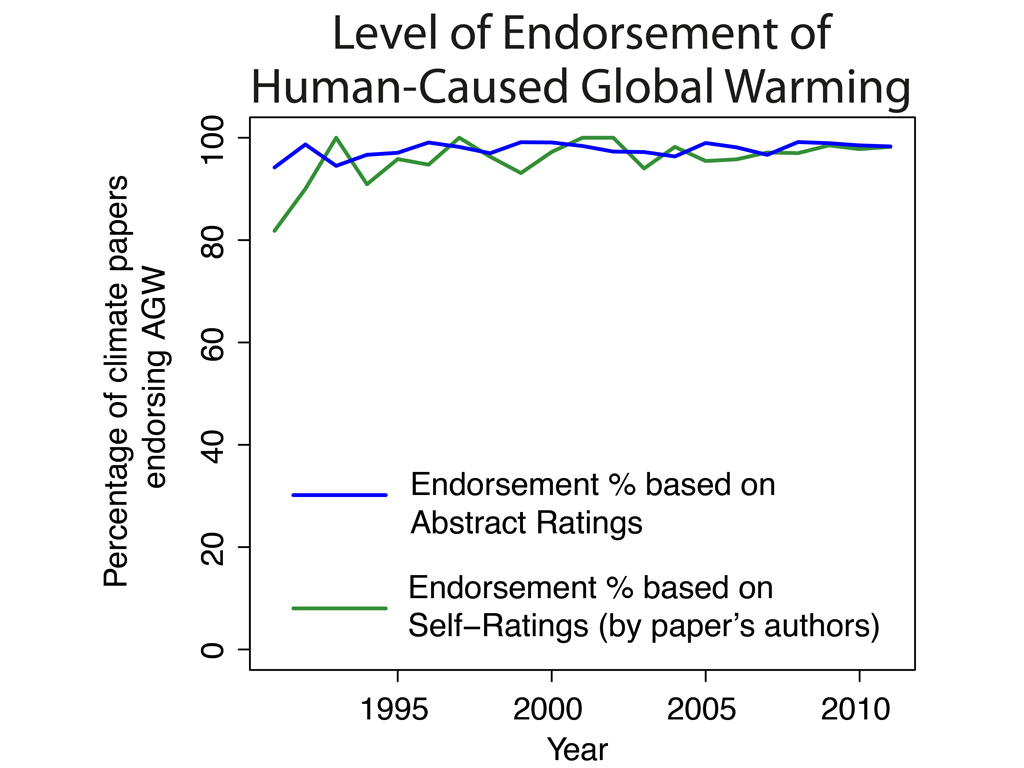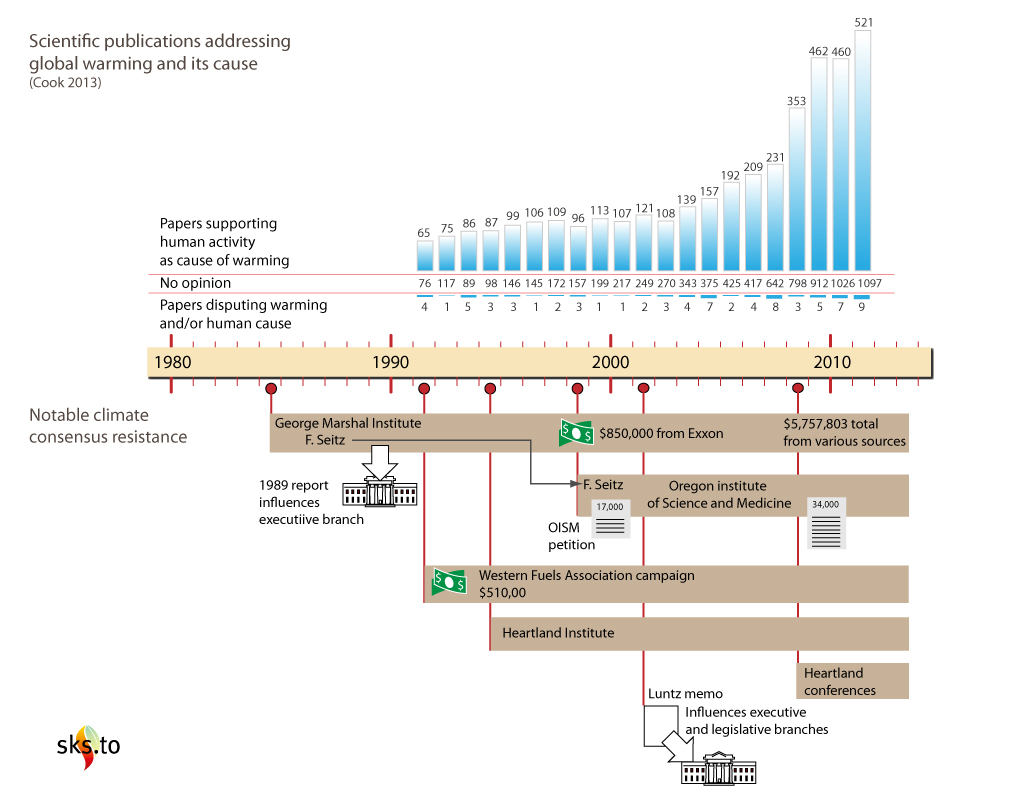by Dana Nuccitelli, Skeptical Science, June 14, 2013
Update: the Chinese Academy of Sciences has released a statement about Heartland's "misleading statement." See below for details.
As Cook et al. (2013) (also known as The Consensus Project)
showed, the consensus in the peer-reviewed scientific literature that
humans are causing global warming has been growing over the past two
decades. In 2011, 98% of papers taking a position on the cause of
global warming agreed that humans are causing it.
Percentage of "global warming" or "global climate change"
papers endorsing the consensus among only papers that express a
position endorsing or rejecting the consensus. From Cook et al. (2013).
However, as Graham Readfearn recently documented,
over those same two decades, fossil fuel interests have engaged in a
number of campaigns to cast doubt on the existence of the consensus on
human-caused global warming. Convincing the public that this settled
science is still in dispute has long been a top priority for industry
groups.
The results of Cook et al. (2013)
juxtaposed with some fossil fuel-funded campaigns to deny the scientific
consensus. Image by jg.
The latest such effort comes from the Heartland Institute. The Nongovernmental International Panel on Climate Change (NIPCC) report
is primarily a Heartland product. Recently, a branch of the Chinese
Academy of Sciences translated the NIPCC report. The Heartland
Institute has trumpeted this fact far and wide, claiming for example:
"The Chinese Academy of Sciences (CAS) will present the two books at a June 15 event in Beijing, a landmark event that puts enormous scientific heft behind the questionable notion that man is responsible for catastrophically warming the planet."
"The trend toward skepticism and away from alarmism is now unmistakable,"
"Publication of a Chinese translation of Climate Change Reconsidered by the Chinese Academy of Sciences indicates the country’s leaders believe their [failure to sign a global climate treaty] is justified by science and not just economics."
These comments sure make it sound like
the Chinese Academy of Sciences has been convinced by the contrarian
content of the NIPCC report! So what did the Chinese Academy actually
say?
Here are relevant comments from the translator's preface on page 8 of the PDF:
"The Intergovernmental Panel on Climate Change (IPCC) issued four assessment reports synthesizing scientific findings on climate change. The most recent report, released in 2007, was IPCC AR4, which found that most of the observed increase in globally averaged temperatures since the mid-20th century is very likely (>90%) due to the observed increase in anthropogenic greenhouse gas concentrations, represents the consensus scientific opinions on international climate change studies. Yet, as with any academic topic, there are still differing viewpoints and debates on the causes, facts, impacts and trends in climate change."
"In order to help Chinese researchers to understand different opinions and positions in debates on climate change, at the end of 2011, we contact The Heartland Institute, the publisher of these two reports."
"The work of these translators, organizations and funders has been in the translation and the promotion of scientific dialogue, does not reflect that they agree with the views of NIPCC"
So basically they acknowledge the
existence of the consensus, and the fact that a few contrarians have
"differing viewpoints," and want to give the contrarians a chance to
make their case. Thus they translated the NIPCC report simply as a
representation of "differing viewpoints," and specifically note the
translation does not indicate that they agree in anyway with the views
of the NIPCC.
Similarly, when asked about the NIPCC report translation and Heartland claims, the Chinese Academy of Sciences responded:
"...this is only a book cooperation between the Lanzhou Branch of the National Science Library and Heartland Institute, and is limited only to copy right trading, with no academic research work involved.
A few CAS experts participated in the translation of the book, aiming to demonstrate different voices in the global scientific field to the Chinese science community, however, that does not mean that we CAS joined the research or agree with their view point; neither does it mean that CAS will decide "promote" the climate "skeptic" view or group."
In fact, the Chinese Academy of Sciences has signed onto this joint statement, in which they endorse the IPCC consensus position on human-caused global warming and note:
"Responding to climate change requires both mitigation and adaptation to achieve a transition to a low carbon society and our global sustainability objectives."
Clearly the Chinese Academy of Sciences
and the country's government have not bought into the Heartland NIPCC
contrarianism. In fact, China has recently been taking a leading role in addressing climate change.
They're testing out a carbon cap and trade system, are trying to ensure
that their coal consumption has peaked, and have reached an agreement
with the USA to reduce hydrofluorocarbon (HFC) emissions, which are potent greenhouse gases. CO2 emissions per unit of electricity generation in China have been falling steadily as they diversify towards more low-carbon energy sources. Does this sound like a country that denies that human greenhouse gas emissions are causing climate change, as Heartland's Joe Bast suggests?
As if Heartland's misrepresentation of
the Chinese Academy of Sciences and the nation's government weren't bad
enough, they also distorted the positions of the Russian and Polish
Academy of Sciences, claiming the translation "follows strong statements by the Russian Academy of Sciences and the Polish Academy of Sciences dissenting from claims that global warming is either man-made or a crisis."
If you follow those links, they lead
to stories that are very different from Heartland's
(mis)representations. The Russian Academy of Sciences claim is based on
a statement from a single scientist from the Institute for Fundamental
Problems of Biology of the Russian Academy of Sciences. What does the
Russian Academy of Sciences actually say about global warming? They
signed the same joint statement
as the Chinese Academy of Sciences, endorsing the IPCC consensus view
that humans are causing global warming, and that we must "transition to a low-carbon society."
The Polish Academy of Sciences claim is based on a statement
from the Academy's geologic science committee. The statement does
express some skepticism about the causes of global warming, but the
committee acknowledges:
"There is no doubt that a certain part of the rise of the level of greenhouse gases, specifically CO2, is associated with human activity therefore, steps should be taken to reduce the amount on the basis of the principles of sustainable development, a cease of extensive deforestation, particularly in tropical regions."
Like its Chinese and Russian
counterparts, the full Polish Academy of Sciences has signed statements
endorsing the human-caused global warming consensus, for example, in 2007 (Google English translation) and in 2010:
"It is widely agreed that human activities are changing Earth’s climate beyond natural climatic fluctuations. The emission and accumulation of greenhouse gases associated with the burning of fossil fuels, along with other activities, such as land use change, are the principal causes of climate change."
So Heartland's claim about "the trend
toward skepticism" (where "skepticism" actually means contrarianism) is
pure fantasy. The reality is that the Chinese, Russian and Polish
Academies of Science all endorse the consensus position that humans are
causing global warming, and that consensus position is growing in the
peer-reviewed scientific literature.
As for the NIPCC report itself, it's BS (Bad Science). Just as one example, the 2009 NIPCC report has an entire sub-section devoted to global warming "fingerprints," and yet it only discusses one -- the tropical troposphere "hot spot" (a part of the atmosphere expected to warm particularly fast as a result of global warming). The NIPCC report has no mention of the many actual fingerprints of human-caused global warming which have been observed (Skeptical Science discusses 10 here). Instead, the NIPCC focuses on the one fingerprint which may (or may not) be missing, even though it's a fingerprint of any global warming, and is not specific to human-caused warming.
If that BS represents the "differing
viewpoints" the Chinese will be exposed to, I wouldn't expect them to
back off their endorsement of the human-caused global warming consensus
any time soon.
Update: the Chinese Academy of Sciences has released a statement about Heartland's "misleading statement," which reads in part:
"the Heartland Institute published the news titled “Chinese Academy of Sciences publishes Heartland Institute research skeptical of Global Warming” in a strongly misleading way on its website, implying that the Chinese Academy of Sciences (CAS) supports their views, in contrary to what is clearly stated in the Translators’ Note in the Chinese translation. The claim of the Heartland Institute about CAS’ endorsement of its report is completely false..."
http://www.skepticalscience.com/heartland-cas-fantasy.html"If the Heartland Institute does not withdraw its false news or refuse to apologize, all the consequences and liabilities should be borne by the Heartland Institute. We reserve the right for further actions to protect the rights of CAS and the translators group."









No comments:
Post a Comment